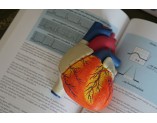Heart Disease
The leading cause of death in men and women over the age of 65 is heart disease. Older people are at a higher risk for heart disease although; the elderly are more likely to have coronary heart disease, or a heart attack. Yet many types of heart disease are for the most part preventable. Controlling illnesses, such as high blood pressure and diabetes, and engaging in a healthy lifestyle can decrease the risk of heart disease.
There are some changes in the heart and blood vessels that ordinarily occur with age, but many other changes that are common with aging are due to modifiable elements that, if not treated, can lead to heart disease.
Some people with heart disease do not have any difficulty functioning on a daily basis. Overall though, most who suffer from heart disease are more restricted in their daily activities. Heart disease is particularly limiting for the elderly.
Differences in activity level for those with and without heart disease are substantial. Adults with heart disease are much more likely to have difficulties with activities of daily living (ADL), such as bathing, eating, dressing, using the bathroom, walking, climbing stairs and getting in and out of bed. Complications are most common among older age groups. Among those with coronary heart disease, about one-third of those are between the ages of 51 and 61, and about half of those are age 70 and older.
Who has heart disease?
Among the population with heart disease, elderly people are at higher risk for heart disease. The elderly have a higher rate of heart disease than any other age group.
What is heart disease?
Heart disease is a form of cardiovascular disease. In addition to heart disease, the term cardiovascular disease includes a variety of heart conditions, such as high blood pressure and stroke.
Coronary heart disease (CHD) is caused by a constricting of the coronary arteries, which results in a decreased supply of blood and oxygen to the heart. CHD includes heart attack and chest pain. A heart attack is caused by the unexpected blockage of a coronary artery, typically by a blood clot. And chest pain occurs when the heart muscle does not get enough blood.
Another type of heart disease is a heart rhythm disorder, which includes heart palpitations, heart murmurs and other related disorders. Congestive heart failure (CHF), which is often the end-stage of heart disease, is another disease of the heart.
Signs and symptoms of heart disease
Heart disease symptoms depend primarily on the type of heart disease you have.
Symptoms of heart disease in the blood vessels
Cardiovascular disease is caused by narrowed, congested or hardened blood vessels that inhibit your heart, brain or other parts of your body from receiving enough blood. Cardiovascular disease symptoms may be different for men and women. For example, men are more likely to have chest pain where women are more likely to have symptoms such as shortness of breath, nausea and extreme fatigue.
Symptoms can include:
- Chest pain
- Shortness of breath
- Pain, numbness, weakness or coldness in your legs or arms
- Pain in the neck, throat, jaw, upper abdomen or back
You might not be diagnosed with cardiovascular disease until you have angina, a heart attack, a stroke or heart failure. It's critical to watch for cardiovascular symptoms and discuss any concerns with your primary care physician. Cardiovascular disease can sometimes be detected early with regular exams.
Symptoms of heart disease caused by abnormal heartbeats
A heart arrhythmia is an irregular heartbeat. Your heart may beat rapidly, too slowly or erratically. Heart arrhythmia symptoms can include:
- Fluttering in your chest
- Racing heartbeat (tachycardia)
- Slow heartbeat (bradycardia)
- Chest pain
- Shortness of breath
- Lightheadedness/Dizziness
- Fainting or near fainting
Symptoms of heart disease caused by weak heart muscle
Cardiomyopathy is the thickening and hardening of the heart muscle. In the early stages of cardiomyopathy, you may have no symptoms at all, but as it progresses, symptoms may include:
- Breathlessness with exertion or at rest
- Swelling of the legs, ankles and feet
- Fatigue
- Irregular heartbeats that feel rapid or fluttering
- Dizziness, lightheadedness and fainting
- Heart disease symptoms can also be caused by heart infections
Symptoms caused by valvular heart disease
The heart has four valves which may become damaged by a variety of different conditions.
Depending on which of the four valves isn't working properly, valvular heart disease symptoms generally include:
- Fatigue
- Shortness of breath
- Irregular heartbeat
- Swollen feet or ankles
- Chest pain
- Fainting
When to get help
Heart failure or end-stage heart disease is a significant problem for patients and their families. This disease is characterized by periods of ups and downs and patients must cope with the irregularity and inconsistency of symptoms.
Patients who have end-stage heart failure experience many symptoms that require frequent and continuous assessment and evaluation of interventions for effectiveness. Both drug and non-drug methods are used. Patient and family support, education and communication are critical at this stage of the disease.
Aggressive pain management and medical treatment options continue to be appropriate in patients who have end-stage heart failure. In the final stage, patients have difficulty managing their symptoms despite the best medical therapy. At this stage, patients and family members may benefit from hospice or an advanced care facility such as a residential care home or nursing home.









